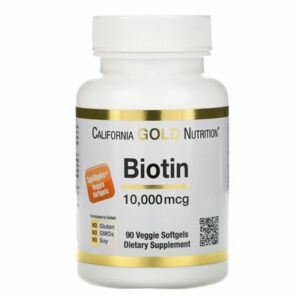Biotin, also known as vitamin B7, is a member of the vitamin B complex. It is the most important cofactor of various carbonic enzymes in the human body. It is an indispensable nutrient for fatty acid synthesis, glycogen regeneration, and amino acid decomposition.
Do you know biotin benefits and side effect?
In addition, biotin has an excellent cosmetic effect and can maintain the strength of hair, skin, and nails. It is often added to beauty products. It can also be called vitamin H.
Table of Contents
- Which foods contain biotin?
- What are the benefits recommended by biotin?
- Are there any side effects of biotin?
- Where to buy biotin capsules recommended by most people?
Which foods contain biotin?
The source of biotin is very wide, including egg yolk, beer, yeast, nuts, beans, whole grains, mushrooms, bananas, cauliflower, fish, etc.
The raw protein contains avidin called Avidin, which will inhibit the body’s absorption rate.
What are the benefits recommended by biotin?
1. Improve hair loss (baldness)
Hair loss is a health problem that many people are concerned about, and it is related to external and self-confidence. It is estimated that nearly 50% of men and women are affected by different patterns of hair loss.
Nutrient deficiency is often associated with chronic telogen hair loss, androgenic alopecia, female pattern alopecia, and patchy alopecia. While biotin is good for hair growth and strong hair, one of the main symptoms of deficiency is hair loss.
A case study pointed out (targeting infants who lacked biotin by feeding formula) that supplementing with biotin can alleviate the symptoms of Perioral dermatitis and Patchy hair loss caused by the deficiency.
*Summary: The effect of biotin on improving hair loss is unknown. Up to now, no complete clinical trials have confirmed that without additional shortage, additional hair can prevent or treat hair loss.
2. Improve Brittle Nails
Brittle nail disease is a disease of abnormal nail structure. The main symptom is the loss of elasticity and softness of the nail, accompanied by cracking, peeling, and crushing. It is estimated that about 20% of the population is affected by this disease, and the incidence of females is male 2 times.
Brittle nail disease is usually idiopathic (referring to an unclear cause), which may be caused by skin or system diseases, nutritional deficiencies, drug use, and trauma.
In animal medicine, biotin is often used to improve hoof defects or abnormalities in ungulates such as horses, cattle, and sheep.
Several human studies have also found that supplementation with biotin helps to improve brittle nail disease (63% to 91% of subjects indicate improvement) and nail plate thickness.
The underlying mechanism is related to improving the synthesis of lipid molecules required for the manufacture of nail plate keratinocytes.
*Summary: Biotin may have the effect of improving brittle nail disease, but because the scale of the research is too small, it needs to be confirmed by more large-scale experiments with an accurate design.
3. Improve diabetes
Diabetes is one of the oldest diseases in human history. It was first discovered in the ancient Egyptian era 3,000 years ago.
The main pathogenic factors of diabetes are related to genes and life factors, such as lack of exercise, sedentary, smoking, and drinking. Obesity factors account for about 55%, which are the most common pathogenic factors.
A small study pointed out that compared with healthy people, the concentration of biotin in the blood of diabetic patients is usually lower, and supplementation can help improve fasting blood glucose values.
Another double-blind controlled study pointed out that (90-day, 447 diabetic patients with poor blood sugar control), compared with single-drug treatment, the additional use of chromium and biotin can have a better sugar control effect (improve glycation Hemoglobin and fasting blood glucose).
The underlying mechanism is related to factors such as biotin’s promotion of glucose synthesis into fat, glucokinase secretion (promoting glycogen synthesis), and triggering of insulin, and is therefore believed to help maintain blood sugar stability.
*Summary: The combined use of biotin and chromium can make blood glucose control more efficient, but the effect of using it alone needs to be verified.
4. Multiple sclerosis
Multiple sclerosis is an autoimmune disease, mainly caused by the progressive damage of the myelin sheath (covered around the nerve fibers) in the brain or spinal cord, which affects other parts of the body.
Depending on the affected area, symptoms may include numbness of the limbs, impaired vision, fatigue, slurred speech, dizziness, etc.
A preliminary small study pointed out that high doses of biotin can help improve the clinical symptoms of multiple sclerosis (slowing the progression of the disease and the degree of disability).
Another double-blind controlled study also found (12 months, 154 patients with multiple sclerosis), compared to placebo, high-dose biotin (100 mg/three times a day) helps reduce the amount of disability Table score (Expanded Disability Status Scale) and improved clinical impression.
The underlying mechanism is related to the following two characteristics of biotin.
A. Activate carboxylase to promote myelin repair (by enhancing fatty acid synthesis).
B. Protect axons from degradation caused by hypoxia (by boosting the energy of neurons).
*Summary: High doses of biotin may help improve multiple sclerosis, but more experiments are needed to confirm.
Are there any side effects of biotin?
Biotin is a very safe nutrient. In most cases, it is safe without side effects. In the study, there have been no consecutive adverse reactions (used to be excreted in urine due to its water-soluble properties) due to its ultra-high dose of 100 mg to 600 mg for several months.
Safety Precautions
Combined with high doses of pantothenic acid (vitamin B5), a competitive effect may occur, hindering biotin absorption.
Taking antibiotics or Sulfonamide antibacterial will destroy the beneficial bacteria in the intestinal tract and cause a decrease in the biotin synthesis rate.
Long-term use of antiepileptic drugs and anticonvulsants will cause the intestinal and renal tubules to absorb and reabsorb biotin.
Is biotin deficiency common?
Because intestinal bacteria can produce biotin on their own, the deficiency is relatively rare. Most of the deficiency occurs in patients with congenital abnormalities or biotinidase and carboxylase deficiency. Symptoms include eczema, hair loss, and conjunctivitis.
Where to buy biotin capsules recommended by most people?
In recent years, food safety problems in various countries have exploded, and it is not healthy but black-hearted products that everyone spends on. Therefore, European and American products with relatively strict quality control have become popular products.
And iHerb.com is a large-scale medical cosmetics e-commerce company in the United States. It has a high satisfaction rate of 97% in the evaluation of Google customers. It provides global home delivery so that you can buy it without risking buying fakes through purchasing high-quality health products.

